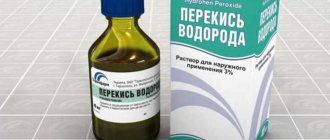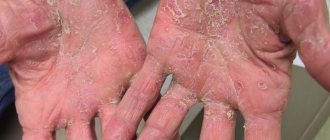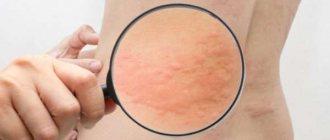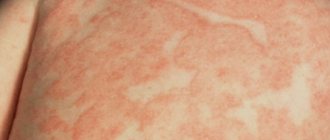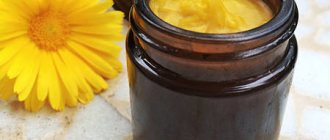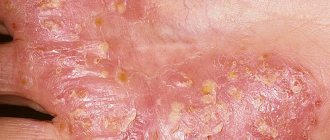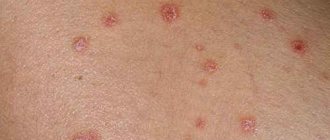- Classification of drugs used
- Immunomodulators
- Immunosuppressants
- Glucocorticosteroids
- Hepatoprotectors
- Antihistamines
- Rules for injections
Treatment of this disease requires an integrated approach. Therapy includes the use of tablets, ointments, creams, shampoos, lotions, physiotherapy, traditional medicine, and spa treatments. As practice shows, injections for psoriasis are the most effective. Their use allows you to eliminate the symptoms of the disease as quickly as possible.
Classification of drugs used
Based on the active substance, injections used for psoriasis are divided into several groups:
- Immunomodulators: Timalin, Pyrogenal, Glutoxim, Polyoxidonium.
- Immunosuppressants: Remicade, Stelara, Humira.
- Glucocorticosteroids: Diprospan, Diprosalik, Metipred, Prednisolone, Flosterone.
- Hepatoprotective agents: Heptral, Heptor.
- Antihistamines: Chloropyramine, Tavegil.
What injections help best for psoriasis? It depends on the form of the disease, its stage, and the characteristics of its course.
Immunomodulators
They effectively suppress the symptoms of the disease and help to increase the period of remission, which significantly improves the quality of life of patients. Medicines with immunomodulatory properties have the following effects:
- normalize metabolic processes in cells and tissues;
- suppress inflammation;
- produce a desensitizing effect;
- normalize the activity of liver enzymes;
- reduce the toxic effect of Methotrexate;
- have a hemostimulating effect;
- increase the effectiveness of PUVA therapy.
Injections of immunomodulators for psoriasis are not prescribed in case of individual intolerance, during pregnancy and breastfeeding.
Drugs
Pyrogenal
It is a liposaccharide of bacterial origin, which is obtained from Pseudomonas aeruginosa or the causative agent of typhoid fever. Used for nonspecific therapy of a number of diseases. The drug does not cause an allergic reaction. Intramuscular or intravenous injections are given daily or at intervals of 1-3 days. The full course includes up to 30 injections. It can be repeated after 3 months.
Timalin
Restores the body's immunological reactivity by regulating the number of B and T lymphocytes. It is used as an immuno- and biostimulant in the complex treatment of diseases associated with decreased cellular immunity, including acute and chronic inflammatory and purulent processes. For psoriasis, daily intramuscular injections are prescribed. Depending on the course of the disease, injections can be given every other day. The average duration of the course is from 10 to 30 days.
Glutoxim
It is an immunomodulator with systemic cytoprotective properties. It has a modulating effect on intracellular processes, including thiol metabolism, which plays a significant role in regulating metabolic and genetic processes in cells. The use of Glutoxim simultaneously with phototherapy helps to increase its effectiveness, reduces the skin's reaction to the effects of the procedure, and increases the resistance of healthy cells to the effects of phototherapy for psoriasis. According to experts, Glutoxim injections reduce the toxic effect of Methotrexate on the liver and blood, making it possible to carry out the course in full. The drug is intended for intramuscular administration. The course includes 20-25 injections.
Contraindications and rules of use
It is strictly forbidden to give injections for psoriasis at home. Injections are prescribed in cases of moderate to severe disease. Injections are carried out only in medical institutions in accordance with the doctor’s prescription. The specialist determines the dosage and selects the most suitable drug, and also monitors the body’s reaction and, if necessary, adjusts the treatment regimen.
Contraindications for each specific injection may vary significantly, but the common ones for most are:
- pregnancy and lactation;
- childhood;
- stomach and duodenal ulcers;
- diabetes;
- serious liver and kidney diseases;
- exacerbation of chronic diseases;
- individual intolerance.
In the severe stage of psoriasis, skillfully selected medications bring significantly quick relief. And in combination with compliance with other doctor’s instructions, including preventive measures, you can achieve a state of remission for several years.
Immunosuppressants
The effectiveness of injections of these drugs against psoriasis is due to their ability to suppress the body's reaction through reversible inhibition of the activity of immunocompetent cells. The mechanism of their action is based on suppressing the process of synthesis of proteins, nucleic acids, and cell division.
Common properties of immunosuppressants include:
- presence of “withdrawal syndrome”;
- inhibition of the functions of other rapidly multiplying cells (mucosal cells, blood cells, germ cells).
Contraindications to the use of this series of drugs are:
- acute infections;
- inhibition of hematopoiesis;
- kidney and liver diseases;
- the presence of malignant tumors;
- individual intolerance to the components of the drug;
- age under 18 years;
- pregnancy.
To treat psoriasis, injections of two types of drugs are given:
- affecting the body as a whole;
- whose action is directed only at specific chains of the immune system - this group includes monoclonal antibodies.
Which ones are more effective?
Since drugs of the first group affect almost all organs and systems, their use requires constant monitoring of changes in the functioning of the cardiovascular system, liver, and kidneys.
Immunosuppressants of the second group specifically affect the part of the immune system associated with the development of psoriasis and its symptoms. Their use requires regular immunological testing to detect possible negative changes in the functioning of the immune system. Most monoclonal antibodies do not affect the functioning of important organs and are intended for the treatment of hepatitis, kidney diseases, and other severe pathologies.
Drugs
Timodepressin
Its immunosuppressive effect is based on reducing the activity of cellular and humoral immunity reactions, reducing the number of markers of lymphocyte activation, and suppressing the activity of PHA lymphocytes. The drug is used for various autoimmune diseases as independent therapy or as part of complex therapy together with other medications prescribed for autoimmune diseases.
It is impossible to cure psoriasis with an immunosuppressant alone, so for this disease, Timodepressin injections are only part of the therapy. A 0.1% solution is administered subcutaneously or intramuscularly in 1-2 ml doses. Injections are given every day for 7 days, then a 2-day break is required. After this, the course is repeated. Taking into account the clinical picture, 3-5 courses are allowed.
Monoclonal antibodies
Stelara
It is a fully human monoclonal antibody. The active substance is ustekinumab. The mechanism of action is based on blocking the synthesis and function of certain proteins that lead to the development of psoriasis.
The use of the drug helps to significantly reduce the histological manifestations of the disease, including proliferation and hyperplasia of epidermal cells. Under the influence of Ustekinumab, there is no significant change in the concentration of cytokines and the ratio of immune cells in the blood, including memory cells and inactive T cells. For what types of psoriasis is the drug more effective? According to the instructions, Stelara should be used for moderate or severe plaque psoriasis in the treatment of persons over 18 years of age.
The dose is 45 mg. The second injection can be given after 4 weeks. The subsequent frequency of injections is 1 time every 12 weeks.
If the patient weighs more than 100 kg, it is recommended to increase the dose to 90 mg.
An increase in the dose is also indicated in case of insufficient clinical effectiveness after use according to the given scheme. In this case, you can increase the dose to 90 mg. The injection is given every 12 weeks. If effectiveness remains low, Stelara is started at 90 mg every 8 weeks. If there is no effect within 28 weeks, the question is raised about the advisability of continuing therapy.
Humira
It is a selective immunosuppressant. Used as monotherapy or in combination with Methotrexate for the treatment of chronic plaque psoriasis and active psoriatic arthritis. Subcutaneous injections are given in the abdomen or thigh once every 14 days. The interval between the first and second injection is 7 days. The duration of the course is 3 months. In the absence of positive dynamics, the advisability of continuing treatment is reconsidered. Humira is not used with Abatacept and Anakira.
Remicade
Chimeric compound with hybrid mouse and human monoclonal antibodies. It is prescribed for the treatment of patients over 18 years of age with moderate or severe psoriasis, as well as with a progressive form of psoriatic arthritis, with damage to 5 or more joints, accompanied by swelling, pain, and limited function. The drug is also used when therapy with basic drugs and NSAIDs is low.
Remicade is administered intravenously through a drip. The maximum permissible rate of administration is 2 ml per minute, duration is 2-4 hours.
For the treatment of scaly and other types of psoriasis, the initial dose is 5 mg/kg. Repeated administration is indicated 2 and 6 weeks after the first procedure, then once every 6-8 weeks. Therapy is carried out in combination with Methotrexate injections in accordance with the 0:2:6 scheme.
According to reviews, the positive effect is noticeable after 3 months. For active psoriatic arthritis, the use of Remicade helps alleviate symptoms and increase the functional activity of patients. In psoriasis, therapy helps reduce the severity of inflammation and normalize keratocyte differentiation.
Injections for psoriasis: comparison of effectiveness
Medicines that are administered intramuscularly or intravenously almost immediately improve the patient’s well-being, eliminating the symptoms of the disease. To quickly relieve the symptoms of the disease and prevent its progression, injectable drugs of various groups are used.
In what cases are certain injections used for psoriasis?
| Type of drug | Impact | Popular drugs |
| Immunosuppressants | suppress the immune system | Stelara, Remicade |
| Immunomodulators | restore the functioning of the body's defenses | Glutoxim, Pyrogenal |
| Glucocorticosteroids | reduce the inflammatory process | Diprospan, Flosteron |
| Hepatoprotectors | restore liver cell protection | Heptor, Heptral |
| Antihistamines | help cope with the symptoms of psoriasis | Tavegil, Chlopyramine |
| Vitamins | help speed up the elimination of symptoms between courses | injections of vitamins A, E and D |
Immunosuppressants
Medicines for psoriasis that belong to this group include monoclonal antibodies. With their help, it is possible to quickly restore the skin. The symptoms of the disease fade away after 2-3 injections.
Principle of action: The effectiveness of immunosuppressants is to reduce the resistance of the body's protective functions, which increases the risk of developing other diseases. Immunosuppressants are effective, but very expensive. The most popular drugs to reduce the activity of the immune system:
- "Stelara" (price: 258,000 rubles). The active substance is ustekinumab. The drug is recommended for persons aged 18 years and older with moderate and severe stages of plaque psoriasis. The course of therapy consists of 4 procedures. Injections are administered subcutaneously at 45 mg.
- "Remicade" (price: 50,500 rubles). The active substance is Infliximab. The drug fights the inflammatory process, heals psoriatic papules and relieves discomfort. It is administered once every 14 days. 4 injections per year are enough. Injections are given in a hospital setting.
Glucocorticosteroids
This group of drugs is used to quickly eliminate the inflammatory process, itching, and swelling. Systemic hormonal drugs in the form of injections are prescribed only when absolutely necessary, in case of severe psoriasis. In particular, they are indicated for psoriatic arthritis. Medicines of this series have a powerful anti-edematous and anti-inflammatory effect. Their use is possible only for a short period of time, under constant medical supervision, since corticosteroids are addictive and cause a number of serious side effects. In addition, after such therapy, other drugs are ineffective. Hormonal drugs have many contraindications, the main of which are disruption of the endocrine system, pregnancy and lactation. What injections are recommended for psoriasis? The main ones: Diprospan, Dexamethasone, Flosteron.
Drugs
Diprospan
The drug has a desensitizing, antitoxic, immunosuppressive, antiallergic, anti-inflammatory, anti-shock effect, regulates metabolic processes, due to which the body better adapts to environmental conditions. It has strong glucocorticoid and low mineralocorticoid activity. The effectiveness of Diprospan injections for psoriasis is due to the properties of its two active components.
Betamethasone sodium phosphate - when it enters the body, it is easily absorbed and produces a rapid effect that lasts for as long as 24 hours.
Betamethasone dipropionate - gradually accumulates in the body over 10 days, then its release begins. Thanks to this property, this ingredient has a prolonged effect.
Reviews from doctors about the advisability of using Diprospan injections are ambiguous. Some consider it a highly effective remedy for psoriasis, almost a panacea for it, others emphasize the high risk of serious complications after such therapy. A temporary improvement in the patient's condition is replaced by an exacerbation of the disease. In many cases, it develops into more severe hormone-dependent forms.
In accordance with the instructions for use, for psoriasis Diprospan injections are given intramuscularly. A total of 3 injections are required with a 2-week interval between them. As a rule, the procedure is not painful, but if necessary, it is possible to combine the drug with an anesthetic: one percent procaine or lidocaine. The dose is determined depending on the clinical picture and severity of the disease.
Diprospan is not used for the following pathologies:
- severe form of hypertension;
- diabetes;
- glaucoma;
- Cushing's syndrome;
- tuberculosis;
- stomach ulcer;
- fungal, viral and purulent infections;
- thromboembolic dysgenitalism;
- mental illness;
- pregnancy.
Long-term use of the drug provokes a number of side effects:
- central nervous system: sleep disorders, agitation, depression, neuroses, anxiety;
- gastrointestinal tract: indigestion, polyphagia;
- metabolism: osteoporosis, corticoadrenal suppression, weight gain, worsening diabetes mellitus, growth retardation in children
For these reasons, Diprospan injections for psoriasis are prescribed only in cases of extreme necessity. The price of one ampoule is approximately 200-240 rubles.
Dexamethasone
It is a fluorinated homolog of hydrocortisone. The active substance prevents the release of inflammatory mediators, suppresses the activity of collagenase, hyaluronidase, proteases, regulates the function of the intercellular matrix of bone and cartilage tissue, helps reduce capillary permeability and stabilize cell membranes. The drug affects all phases of inflammation. Achieving an antiproliferative effect is associated with inhibition of the process of migration of monocytes to the site of inflammation and proliferation of fibroblasts.
According to doctors, for psoriasis, Dexamethasone injections have anti-inflammatory, immunosuppressive, anti-allergic, and anti-shock effects.
For the treatment of scaly lichen (psoriasis), droppers and injections are prescribed.
Intravenous administration of the drug is carried out by drip or stream. 4 to 20 mg of Dexamethasone is prescribed intramuscularly 3 or 4 times a day. The maintenance dose is 0.2-9 mg per day, course duration is up to 4 days.
When treating children, the daily dose is reduced to 0.02-9 mg. The drug is administered 1 or 2 times a day.
When administered intra-articularly, the dose of the drug is 0.2-6 mg. Repeated administration is possible after an interval of 3 days to 3 weeks.
Contraindications to the use of Dexamethasone are:
- diseases of bacterial, fungal or viral etiology;
- active forms of tuberculosis;
- immunodeficiency states;
- diseases of the gastrointestinal tract;
- pathologies of the cardiovascular system;
- diabetes;
- acute renal or liver failure;
- psychoses.
Intra-articular injections are not prescribed:
- with joint instability;
- in case of pathological bleeding;
- in the presence of infected lesions in the joints.
Doctors warn of a high risk of developing a number of serious side effects when receiving Dexamethasone injections for psoriasis in the cardiovascular, nervous, immune, endocrine systems, gastrointestinal tract, metabolism, and skin.
Diprosalik
Before injections of hormonal drugs for psoriasis, it is recommended to use the drug Diprosalik in the form of an ointment or solution. It is also a corticosteroid, but a weaker one.
The active ingredients are betamethasone dipropionate and salicylic acid.
Betamethasone dipropionate helps to quickly achieve anti-inflammatory, antiallergic, antipruritic effects.
Salicylic acid has an antimicrobial effect, promotes deeper penetration of active components into the layers of the skin, and restores the protective function of the skin.
The ointment has a pronounced anti-inflammatory, antibacterial, vasodilator, keratolytic and fungicidal effect.
At the beginning of therapy, the drug is applied to the affected areas twice a day, then the number of applications is reduced to 1 time per day. The duration of treatment is from 1 to 4 weeks.
Hepatoprotectors
The liver is the body's main filter. To maintain its function, complex therapy for psoriasis includes hepatoprotectors - medications that protect liver tissue from the negative effects of toxic compounds and promote the restoration of damaged cells. The most popular of them are Heptor and Heptral. Injections of these drugs have an antioxidant, detoxifying, regenerating effect. The course includes the administration of approximately 10-15 doses of hepatoprotectors.
Drugs
Heptral
The active ingredient is ademetionine. It has choleretic, cholekinetic, detoxifying, antioxidant, regenerating, neuroprotective, antifibrosing properties. For the effectiveness of therapy for psoriasis, intramuscular or intravenous injections are first prescribed, which are gradually replaced with tablets. The solution is prepared based on powder and solvent immediately before use. It is injected into a vein at a slow pace. The recommended daily dose is 5-12 mg per 1 kg of patient weight.
Heptor
The active ingredient is ademetionine. The drug is a hepatoprotector with antidepressant activity. It has choleretic, cholekinetic, antioxidant, antifibrosing, detoxification effects. Replenishes the lack of ademetionine in the body and also stimulates its synthesis.
The drug is administered intramuscularly and intravenously. During the first 2-3 weeks, the daily dose is 400 to 800 mg.
The lyophilisate can only be dissolved in the supplied solvent. After intensive therapy, they switch to taking the drug in tablet form.
Antihistamines
In some cases, the drugs used for psoriasis not only suppress the disease, but also provoke allergic reactions in the body. To eliminate them, antihistamines are used in the form of injections. Which ones are more effective? The most popular today are Chloropyramine and Tavegil. They have antiedematous, antipruritic, antispastic, anticholinergic, sedative and local anesthetic effects.
Tavegil
It has a pronounced antiallergic, antipruritic effect, reduces vascular permeability, inhibits exudation, and has anticholinergic and sedative properties. The effect of the drug lasts up to 12 hours.
The drug is administered intramuscularly or intravenously, 2 ml twice a day. For preventive purposes, intravenous jet administration of Tavegil is prescribed (dose - 2 ml).
Chloropyramine
The drug is an H1-histamine receptor blocker, a derivative of ethylenediamine. Prevents immediate allergic reactions and also facilitates their course. It has a pronounced antipruritic and sedative effect. Produces a hypnotic effect. Anticholinergic and antispasmodic activity is expressed to a moderate extent.
A 2% solution is administered intravenously and intramuscularly. The dose for adults is 1-2 ml, for children under one year old – 6.25 mg, from 1 to 6 years – 8.33 mg, from 7 to 14 years – 12.5 mg. Procedures are carried out 2 or 3 times a day.
Methotrexate
The drug belongs to the group of antimetabolites-antagonists of folic acid. Suppresses the synthesis of thymidylate and purine nucleotides, leads to disruption of DNA and RNA synthesis, interferes with cell growth and division, leading to their death. Shows activity in relation to tissues with pronounced cell proliferation.
In psoriasis, the use of Methotrexate is considered justified in case of a significant area of damage (more than 20%), with the development of a pustular form of the disease, psoriatic erythroderma, psoriatic arthritis, psoriasis with severe damage to the nails, an atypical form of the disease that cannot be treated with local therapy or photochemotherapy.
For psoriasis, various regimens for using Methotrexate can be used. According to experts, the maximum effectiveness is shown by the injection regimen, which provides for intravenous or intramuscular administration of the drug once a week during the period of exacerbation of the disease. The dose ranges from 10 to 30 mg.
Calcium gluconate
This drug has found wide use in complex therapy of the disease. The solution strengthens the vascular wall, relieves itching and inflammatory swelling. Reviews from experts about calcium gluconate injections prove their particular effectiveness for progressive, widespread and exudative psoriasis, which is characterized by weeping and severe itching and localization of lesions in the area of large folds and lower extremities.
The drug has anti-inflammatory, desensitizing, detoxifying, antiallergic effects, reduces the permeability of capillaries and cell membranes.
Before starting treatment, a biochemical blood test is necessary. High calcium levels are a contraindication to the administration of the drug. Calcium gluconate is not used for thrombophlebitis, arterial hypertension and hypercoagulation.
Intramuscular or intravenous injections of 10% calcium gluconate are given for psoriasis. When treating children, intravenous administration is preferable.
Adults are administered 5-10 ml of the drug 1-3 times a day or every other day. How much solution is needed to treat children depends on their age. The pediatric dose can be 1-5 ml. The frequency of administration is every 2-3 days.
Intramuscular injections sometimes provoke necrosis or a decrease in heart rate. Therapy is not combined with other forms of calcium as this may cause kidney damage.
If the dosage is exceeded, hypercalcemia develops. To eliminate it, the patient is administered calcitonin. The dose is 5-10 IU per 1 kg of weight.
As a rule, calcium gluconate is well tolerated by patients. The drug helps reduce inflammation, swelling, itching, the area of psoriatic rashes, normalize sleep, and eliminate irritability.
Unithiol
The mechanism of action of the drug is close to complexones - organic compounds that form strong compounds with positive metal ions. The drug contains two sulfide groups. Reacting with thiol poisons in tissues and blood, they form non-toxic compounds, which are then excreted in the urine. Thanks to the binding of poisons, the body's enzyme systems are restored.
There is evidence of a positive effect of the drug on capillary permeability and the state of the peripheral nervous system. Unithiol injections for psoriasis are prescribed for outpatient treatment to relieve intoxication. The course includes 10 intramuscular injections of a 5% solution (dose – 5 ml).
The drug is not indicated for hypertension and severe liver damage.
What injections for psoriasis are prescribed as part of therapy?
The main symptoms of psoriasis are scaly rashes on the skin. Often the pathology becomes more complicated and affects internal organs. Therefore, the treatment of scaly lichen should be approached comprehensively. In severe cases, doctors prescribe injections for psoriasis.
The essence of injection treatment of pathology
The essence of injection treatment for scaly lichen is that a medicinal solution is injected intravenously or intramuscularly.
The injections act faster than oral and external medications: discomfort disappears almost immediately, wounds begin to heal, and psoriatic plaques become smaller in size.
Various injectable medications are used in the treatment of psoriasis. Their action is aimed at relieving itching, inflammation, autoimmune reaction and normalizing keratinization. Injections help in treating not only the skin, but also joints and organs.
Injection therapy is carried out during the acute stage of the disease.
What injections are given for psoriasis: names of the most effective drugs
Pharmacies sell a lot of injections for psoriasis. They belong to different groups, differ in composition, methods of influence and application, severity of the therapeutic effect, and cost.
List of the most effective drugs:
- Pyrogenal.
- Timalin.
- Glutoxim.
- Thymodepressin.
- Stelara.
- Remicade.
- Dexamethasone.
- Diprospan.
- Diprosalik.
- Heptral.
- Heptor.
- Kenalog.
- Tavegil.
- Chloropyramine.
- Calcium gluconate.
Immunomodulatory
Immunomodulators are used to eliminate most of the symptoms of lichen planus and achieve stable remission.
Drugs of this group restore metabolic processes in the epidermal integument at the cellular level.
The most effective immunomodulatory agents are:
- Pyrogenal. The active substance is bacterial lipopolysaccharide. Well tolerated and does not cause allergies. The therapeutic course is 10-30 injections. The drug is administered every other day or daily.
- Timalin. The active ingredient is thymus extract. Improves the functioning of the immune system. The course of treatment is 10-30 injections.
- Glutoxim. The active substance is disodium glutamyl-cysteinyl-glycine. Restores metabolic processes, strengthens the immune system. Therapeutic course - 20-25 injections.
Antihistamines
It happens that allergies occur to certain foods and medications. It may cause an exacerbation of psoriasis. Antihistamines are used to relieve an allergic reaction.
Most often, doctors prescribe:
- Kenalog . Contains triamcinolone. It has anti-inflammatory, antipruritic and antiallergic effects. Intended for intramuscular administration. Therapy lasts about a week. The solution is administered twice a day.
- Tavegil. Made from clemastine. Removes allergic manifestations and itching. Increases vascular permeability and has a sedative effect. Two injections are given per day with an interval of 12 hours.
- Chloropyramine. The active substance is chloropyramine. Relieves the manifestations of allergies and prevents them from developing in the future. Injections are given twice a day.
- Calcium gluconate. Used as part of complex therapy. Relieves swelling, inflammation, strengthens the walls of blood vessels.
Calcium gluconate
A hot injection eliminates swelling and itching, improves skin color.
The drug reduces the area of psoriatic rashes and relieves inflammation. It is prescribed when the disease begins to worsen.
Injections are given three times a week. The solution is administered intramuscularly or intravenously.
During therapy, side effects are possible: bradycardia, nausea, feeling hot.
Injections of calcium gluconate are prohibited in case of impaired renal function or failure of the heart muscle.
In what cases are hormonal injections prescribed in the hospital for psoriasis?
Severe forms of psoriasis are usually treated in a hospital. Doctors usually prescribe hormonal drugs. Such medicines are considered the most effective. Injections are used when drugs in the form of tablets and ointments do not give a positive result.
The drugs are administered intravenously or intramuscularly. The dosage is determined by the doctor individually for each psoriasis patient. Hormonal injections are part of a comprehensive treatment.
Hormone-based drugs negatively affect the condition of the liver and kidneys. Therefore, therapy is carried out under the strict supervision of doctors.
What medications help during exacerbation of the disease?
During the period of worsening of lichen planus, the goal of treatment is to relieve the acute condition and put the disease into remission. To do this, doctors recommend taking different groups of medications.
The following remedies help best:
- hormones (Dexamethasone, Triamcinolone);
- detoxification drugs (magnesium sulfate, sodium thiosulfate, Reamberin);
- immunosuppressants (Stelara, Krizanol);
- retinoids (Acitretin);
- essential phospholipids (Essentiale);
- vitamins (Milgamma);
- antibiotics;
- diuretics;
- stimulants (Lidaza, Taktivin);
- cytostatics (Methotrexate).
First of all, detoxification and immunosuppressive drugs are prescribed. In severe cases, with erythroderma, pustular form of psoriasis, hormones are added. When an infection occurs, antibiotics are prescribed.
How to give injections at home correctly
Usually injections are given in a hospital. Some medications can be taken at home. It is allowed to independently administer injections of antihistamine, detoxification, anti-inflammatory, antibacterial, and vitamin groups.
Rules for giving injections:
- Wash your hands with soap.
- Treat the injection site with alcohol.
- Take a disposable syringe and remove the cap from the needle.
- Take the solution.
- Force the air out of the syringe.
- Pinch the skin between your thumb and index finger.
- Insert the needle sharply to 3/4 of its length.
- Introduce the drug slowly.
- Remove the needle.
- Wipe the puncture site with alcohol.
What to do if a papule appears after an injection in the shoulder
Long-term injection treatment can lead to the formation of papules at the injection site.
If the lump does not hurt, does not become hot and red, then there is no need to worry: the lump will resolve on its own.
Pharmacy medications can speed up this process.
The following medications are effective:
- gels Lyoton, Troxerutin, Troxevasin;
- Traumeel ointment;
- Heparin ointment.
Medicine prices
The cost of injections for psoriasis depends on the type of drug, its dosage, the number of ampoules in the package, the manufacturer, and the pricing policy of the distributor. In online stores, medications are cheaper than in traditional pharmacies.
Cost of remedies for scaly lichen:
- Pyrogenal – 1200 rubles.
- Timalin - from 390 rubles.
- Glutoxim – 700 rubles.
- Timodepressin – from 1000 rubles.
- Stelara – from 180 rubles.
- Remicade – from 9400 rubles.
- Dexamethasone – 100-250 rubles.
- Diprospan - from 88 rubles.
- Diprosalik - from 600 rubles.
- Heptral – 1670 rubles.
- Heptor - from 640 rubles.
- Calcium gluconate – from 114 rubles.
- Tavegil - from 200 rubles.
- Kenalog – from 114 rubles.
- Chloropyramine – from 75 rubles.
Rules for injections
Based on patient reviews on forums, we can conclude that injections for psoriasis are the most effective and fastest way to eliminate symptoms, improve the condition of patients and achieve long-term remission. However, their implementation requires compliance with a number of rules.
For psoriasis, injections are recommended only in cases of severe or moderate stage of the disease. According to experts, for local or general treatment, injections do not produce the desired effect.
Procedures are carried out exclusively in medical institutions. Only under this condition is it possible to provide timely assistance in case of complications.
Injections and drip administration of drugs are carried out according to the indications of a specialist, under his constant supervision, with strict adherence to the dosage.
Which injections are the most effective: reviews from doctors and patients
Various injections are used to treat psoriasis of the scalp, palmoplantar, elbow, guttate, plaque and other forms. To understand which injectable drugs are the most effective, it is worth reading the opinions of patients and doctors.
Reviews from doctors and psoriasis sufferers:
- Vitaly. I have had vulgar psoriasis for several years now. I was treated with various drugs, but could not achieve long-term remission. The doctor prescribed Stelara as injections. I felt improvement during the therapy already in the first week: the itching went away, the plaques turned pale. I have not taken any medications for six months now. There have been no relapses yet. That's why I chose Stelara.
- Valery. I am a dermatologist with 25 years of experience. I recommend Timodepressin to my patients with severe psoriasis. This drug is the most effective and does not cause side reactions. Manifestations of lichen planus with treatment with Timodepressin disappear within a couple of weeks.
Thus, injections are used to treat severe psoriasis or complications of the disease. The drugs differ in their properties and principle of action. Typically, injection treatment is carried out in a hospital setting. But anti-inflammatory and antihistamines can be injected at home.
Injections for psoriasis are the most effective in treating the disease. This can be explained simply - the disease is systemic in nature, i.e. affects many body systems. Its causes most often also come from dysfunction of organs and systems. And therefore the impact on the disease must also be systemic.
External remedies in the form of creams/ointments, baths can only reduce symptoms and cause temporary relief. The injections affect the entire body, regulating metabolic processes and the functioning of such important systems as the immune and endocrine.


